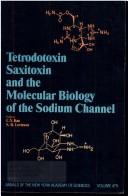| Listing 1 - 6 of 6 |
Sort by
|

ISBN: 0398035431 Year: 1977 Publisher: Springfield, Ill.
Abstract | Keywords | Export | Availability | Bookmark
 Loading...
Loading...Choose an application
- Reference Manager
- EndNote
- RefWorks (Direct export to RefWorks)
Multi
ISBN: 9780702077876 0702077879 9780702077869 0702077860 Year: 2020 Publisher: Philadelphia, PA : Elsevier,
Abstract | Keywords | Export | Availability | Bookmark
 Loading...
Loading...Choose an application
- Reference Manager
- EndNote
- RefWorks (Direct export to RefWorks)
"Botulinum Toxin in Facial Rejuvenation, 2nd Edition, covers the entire range of the use of botulinum toxin for cosmetic purposes. Dr. Kate Coleman offers practical guidance for safe handling, selection and assessment of patients, potential complications and pitfalls, and aesthetic techniques, as well as comparative modalities and long-term management. This is an ideal resource for anyone who offers this sought-after procedure, including cosmetic surgeons, oculoplastic surgeons, dermatologists, physician's assistants, and registered nurses"--Publisher's description.
Botulinum toxin --- Facelift. --- Botulinum Toxins, Type A --- Face --- Cosmetic Techniques. --- Injections, Intramuscular. --- Therapeutic use. --- Botulinum Toxins, Type A. --- Face.

ISBN: 9780702038020 0702038024 9780723433491 0723433496 Year: 2004 Publisher: [Place of publication not identified] Mosby
Abstract | Keywords | Export | Availability | Bookmark
 Loading...
Loading...Choose an application
- Reference Manager
- EndNote
- RefWorks (Direct export to RefWorks)
Botulinum toxin --- Facelift. --- Botulinum Toxins, Type A --- Face. --- Cosmetic Techniques. --- Injections, Intramuscular. --- Patient Care Management --- Skin Aging. --- Therapeutic use. --- therapeutic use. --- methods. --- drug effects. --- Skin Aging

ISBN: 0897663535 0897663543 9780897663533 Year: 1986 Volume: 479 Publisher: New York (N.Y.): New York Academy of Sciences,
Abstract | Keywords | Export | Availability | Bookmark
 Loading...
Loading...Choose an application
- Reference Manager
- EndNote
- RefWorks (Direct export to RefWorks)
Animal biochemistry --- Ion Channels --- Saxitoxin --- Tetrodotoxin --- Sodium channels --- Neurotoxic agents --- metabolism --- Physiological effect --- Ion Channels. --- 577.352.465 --- -Saxitoxin --- -Sodium channels --- -Tetrodotoxin --- -#WPLT:dd.prof.J.Vendrig --- Fuga toxin --- Tarichatoxin --- Marine toxins --- Pyrimidines --- Channels, Sodium --- Ion channels --- Sodium --- Gonyaulax toxin --- Paralytic shellfish poison --- Algal toxins --- Purines --- Neuropoisons --- Neurotoxicants --- Neurotoxins --- Poisons --- Ion Channel --- Ionic Channel --- Ionic Channels --- Membrane Channel --- Membrane Channels --- Channel, Ion --- Channel, Ionic --- Channel, Membrane --- Channels, Ion --- Channels, Ionic --- Channels, Membrane --- Signal Transduction --- metabolism. --- Ion transport --- -Congresses --- Congresses --- Physiological transport --- ION CHANNELS --- SAXITOXIN --- TETRODOTOXIN --- Congresses. --- congresses. --- 577.352.465 Ion transport --- Metabolism --- #WPLT:dd.prof.J.Vendrig --- Physiological effect&delete& --- Ion Channels - congresses --- Saxitoxin - metabolism - Congresses --- Tetrodotoxin - metabolism - Congresses --- Tetrodotoxin - Physiological effect - Congresses --- Saxitoxin - Physiological effect - Congresses --- Sodium channels - Congresses --- Neurotoxic agents - Physiological effect - Congresses
Periodical
Abstract | Keywords | Export | Availability | Bookmark
 Loading...
Loading...Choose an application
- Reference Manager
- EndNote
- RefWorks (Direct export to RefWorks)
Oncology. Neoplasms --- Carcinogenesis --- Mutagens --- Teratogenic agents --- Teratogens. --- Mutagens. --- Carcinogens. --- Carcinogenesis. --- Teratogenic agents. --- Teratogenese. --- Health Sciences --- Life Sciences --- Oncology --- Cytology, Cell Biology --- Toxicology --- Zoology --- Teratogens --- Mutagenic agents --- Cancer --- Oncogenesis --- Pathogenesis of cancer --- Tumorigenesis --- Oncogens --- Tumor Initiators --- Tumor Promoters --- Initiators, Tumor --- Promoters, Tumor --- Clastogens --- Genotoxins --- Embryotoxins --- Fetotoxins --- Pathogenesis --- Abnormalities, Human --- Teratogenesis --- Mutagenesis --- Mutation (Biology) --- Pathology --- Genetic toxicology --- Benzidines --- Carcinogens --- Mutation --- Abnormalities, Drug-Induced --- Etiology --- Carcinogen --- Oncogen --- Tumor Initiator --- Tumor Promoter --- Initiator, Tumor --- Promoter, Tumor --- Clastogen --- Genotoxin --- Mutagen --- Teratogen --- teratogens. --- carcinogens. --- mutagens. --- clastogens --- genotoxins --- toxic substances --- DNA damage --- genotoxicity --- induced mutation --- mutagenesis --- mutation --- carcinogenic agents --- carcinogenic compounds --- carcinogenic factors --- aflatoxin M2 --- aflatoxins --- anticarcinogenic activity --- anticarcinogenic agents --- asbestos --- carcinogenesis --- carcinogenicity --- carcinosarcoma --- haloacetic acids --- nitrosamines --- nitroso compounds --- safrole --- sterigmatocystin --- embryotoxins --- fetotoxins --- anabasine --- polychlorinated dibenzodioxins --- T-2 toxin --- teratogenicity
Book
ISBN: 9780691192123 9780691224725 0691224722 069119212X 0691230595 Year: 2021 Publisher: Princeton, N.J. Princeton University Press
Abstract | Keywords | Export | Availability | Bookmark
 Loading...
Loading...Choose an application
- Reference Manager
- EndNote
- RefWorks (Direct export to RefWorks)
"Plagues upon the Earth is a history of human civilization and the germs that have shaped its course. At every stage in our species' past, micro-organisms have had macro-effects on the development of human societies. Kyle Harper proposes the first history of human disease to make full use of a radical new source of evidence: pathogen genomes as a biological archive and window into prehistoric times. We can now begin to reconstruct the natural history of human disease at the molecular level, tracing the biographies of the viruses, bacteria, and protozoa that have haunted our species. The story reveals, Harper will show, the continuing importance of the deep past in determining the patterns of global divergence today. Plagues upon the Earth puts the dynamic two-way relationship between humanity and its germs in the foreground. The takeover and transformation of the planet by Homo sapiens has been the most powerful force shaping the evolution of microbial pathogens, and in turn, pathog en evolution has been a decisive influence on the destiny of human societies. From humanity's dispersal out of Africa to the rise of agriculture and complex civilizations, from the great pandemics of the medieval world to the age of global expansion and industrialization, from the modern increase in life expectancy to the ongoing threats of microbial resistance and emerging pathogens like HIV and Ebola, disease evolution has been and remains a primary, powerful, and unpredictable factor in human history. This will be the story of how we made our germs, and how our germs made the world as we know it. Harper aims to cover the entire timespan of Homo sapiens and to set the history of our species in deep perspective. The pathogens that exist today are the heirs of millions of years of evolution. Similarly, the patterns of economic development, and the roots of global inequality, have distant origins. Thus, Harper aims to bring together two bodies of literature: the history of disease and t he study of geography and social development. The book is global in coverage, insisting on the importance of understanding how the tropics and temperate zones, the Old World and the New World, differ and interact throughout the course of history. Viruses, bacteria, and protozoa - in all their peculiarity and specificity - have played an enormous part in shaping the different outcomes experienced by human societies. Plagues upon the Earth combines biology, geography, and economics to understand these differences but emphasizes the central importance of evolution as a source of constant change. The past is always present in the history of disease, and the future is always unpredictable. The story continues right up to our own world. The book closes with a reflection on antibiotic resistance as a form of evolution that continues the ancient molecular antagonism between pathogens and host immune systems, and the importance of seeing this struggle in a broader environmental framework. Freed om from infectious disease remains an unachieved goal for our species, which is more interconnected than ever. The biology of infectious disease has been one of the great forces shaping the patterns of global development, but only with a sense of history - of the interplay of change, conjunction, and chance - can we begin to understand the intertwined story of human societies and their germs"-- "How pathogenic microbes have been an intimate part of human history from the beginning-and how our deadliest germs and biggest pandemics are the product of our success as a speciesPlagues upon the Earth is a monumental history of humans and their germs. Weaving together a grand narrative of global history with insights from cutting-edge genetics, Kyle Harper explains why humanity's uniquely dangerous disease pool is rooted deep in our evolutionary past, and why its growth is accelerated by technological progress. He shows that the story of disease is entangled with the history of slavery, colonialism, and capitalism, and reveals the enduring effects of historical plagues all around us, in patterns of wealth, health, power, and inequality. He also tells the story of humanity's escape from infectious disease-a triumph that makes life as we know it possible, yet destabilizes the environment and fosters new diseases.Panoramic in scope, Plagues upon the Earth traces role of disease in the transition to farming, the spread of cities, the advance of transportation, and the stupendous increase in human numbers. Harper offers a new interpretation of humanity's path to control over infectious disease-one where rising evolutionary threats constantly push back against human progress, and where the devastating effects of modernization contribute to the great divergence between societies. The book reminds us that human health is globally interdependent-and inseparable from the well-being of the planet itself.Putting the COVID-19 pandemic in perspective, Plagues upon the Earth tells the story of how we got here as a species, and it may help us decide where we want to go"--
Epidemics --- Plague --- Diseases --- HISTORY / Social History --- MEDICAL / Infectious Diseases --- History. --- Human ecology. Social biology --- Biological anthropology. Palaeoanthropology --- History of human medicine --- World history --- Epidemics. --- Disease outbreaks --- Outbreaks of disease --- Pandemics --- Pestilences --- Communicable diseases --- Outbreaks --- Disease and lhistory. --- Diseases. --- Diseases and history. --- History and diseases --- History --- Influence on history --- HISTORY / Social History. --- MEDICAL / Infectious Diseases. --- Plague. --- Bubonic plague --- Yersinia infections --- Agriculture (Chinese mythology). --- Agriculture. --- Ancient DNA. --- Angus Deaton. --- Annoyance. --- Bacteria. --- Balance of nature. --- Big History. --- Biological agent. --- Bioterrorism. --- Bubonic plague. --- Cause of death. --- Cellulose. --- Chimpanzee. --- Cholera. --- Chronic condition. --- Chronology. --- Climate change. --- Consilience (book). --- Consilience. --- Countermeasure. --- Demography. --- Diarrhea. --- Disease burden. --- Disease ecology. --- Disease. --- Disinfectant. --- Domestication of the horse. --- Domestication. --- Dysentery. --- E. O. Wilson. --- Ecological niche. --- Ecology. --- Emergence. --- Endemic (epidemiology). --- Environmental protection. --- Epidemic. --- Fossil fuel. --- Fungus. --- Genome, Viral. --- Geography. --- Global catastrophic risk. --- Global health. --- Globalization. --- Health. --- Host (biology). --- Human pathogen. --- Hunter-gatherer. --- Infection. --- Influenza. --- Insect. --- Insecticide. --- Iron Age. --- Louis Pasteur. --- Lymph node. --- Malaria. --- Measles. --- Meat. --- Microorganism. --- Microparasite. --- Mortality rate. --- Negative feedback. --- Neolithic Revolution. --- Organism. --- Origin story. --- Pathogen. --- Phylogenetics. --- Physical geography. --- Plagues and Peoples. --- Poliomyelitis. --- Prevalence. --- Protozoa. --- Public health. --- Pus. --- RNA. --- Refrigeration. --- Reproduction. --- Risk. --- Root cause. --- Slavery. --- Smallpox. --- Sore throat. --- State formation. --- Steamship. --- Taxon. --- Technology. --- Thucydides. --- Toxin. --- Tuberculosis. --- Typhoid fever. --- Typhus. --- Unintended consequences. --- Urbanization. --- Vaccination. --- Vaccine. --- Vegetable. --- Vulnerability (computing). --- Vulnerability. --- Whole genome sequencing. --- Yellow fever.
| Listing 1 - 6 of 6 |
Sort by
|

 Search
Search Feedback
Feedback About UniCat
About UniCat  Help
Help News
News